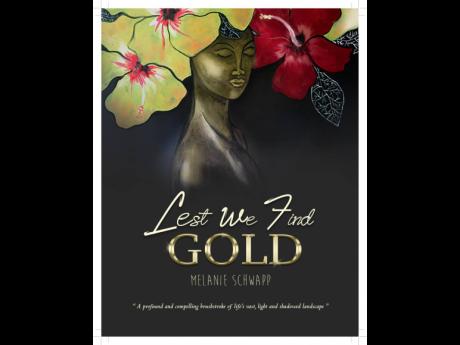Domestic violence is not a novel theme at all. There have been many movies and books that deal with this painful yet very real theme. Melanie Schwapp’s newest book “Lest We Find Gold” tackles this awful reality. But her treatment is anything but trite, tired or trivial.
“Lest We Find Gold” is about a woman who appears to have it all…handsome, successful, popular husband, a beautiful home and social standing that grants access and privilege. But there’s a part of her life that is painful and shameful to her that she tries to hide from those around her. This is not a spoiler, since the book opens in the very first chapter with a vivid description of the main protagonist, Milly, being battered by the man she is married to. Being brutalized in her beautiful home. The juxtaposition of the brutality with the splendor of her living arrangements is jarring and disturbing. This review will not say how Milly’s story ends. You must read the book to find that out. But Schwapp’s treatment of this age-old theme got me thinking…
Domestic Abuse: How? Why?
How do seemingly intelligent, beautiful, GOOD women end up in a situation where another adult is able to beat on them, repeatedly? I’m sure this is something we’ve all asked ourselves when we hear the whispers or see the signs or even end up in a similar situation. How? Why? Why stay?
In Milly’s own words: “we choose every day…how we love, how we don’t…if we stay, if we don’t. We know where the roads will lead us. If only we are honest enough to read the signs.” I hear you saying…”victim shaming though”…
This is anything but. It is a thorough, blunt, thought provoking, painful in its laying bare, treatment of domestic abuse.
Nothing really happens in a vacuum…
The back-story is always important. It provides context and attempts to explain and rationalize the “why”. Melanie provides the context for us in the rich tapestry of characters and relationships that she brings to life. The supporting cast in “Lest We Find Gold” establishes context for the choices Milly makes and the consequences of those choices. No blame is cast, no shifting of responsibility, no wringing of hands happens. It’s simply Life. Milly’s life is made real to us as we are taken through the dynamics of her family background, her friends and relatives and her progression from girl-child to woman in that context.
Our Relationships & Self Esteem
We get to observe and explore the contradictions that define many of our significant relationships, and to see just how, even at a subconscious level, perhaps especially at the subconscious level, our own inclinations and decisions are informed by them. The whole issue of self-esteem features prominently and is something that most women can relate to. And yes, so much of our self-esteem is tied to our physical self. Superficial? Perhaps. We live in a superficial world though, where judgments are made every day on what the eyes see. How many times have deliberate and even passing comments on our physical attributes informed how we feel about ourselves? A careless remark from an old lover. A casual observation from Mother. A deliberate attack by an enemy. And we end up making love only in the dark. Or never cutting our hair again. Or being afraid to speak publicly…
“The older I got the more the shame filled me. The older I got, the more my ass grew, and the more my ass grew, the more of the panic I saw on my mother’s face. The more the panic I saw, the angrier I felt, The angrier I felt, the more the shame grew.”
And this is why self-esteem and the lack thereof is so important: the degree to which we feel “worthy” or “unworthy” plays into what we aspire to and eventually accept.
Milly’s Significant Relationships and her “How” and “Why”
Milly’s relationship with her mother is central to her own feelings of worth and yes, it informs the choices she makes.
“I felt rotten. I felt good. I felt like my mother. I wanted to bawl. I wanted to do it again. I swore that I wouldn’t…“
“We get what we deserve”
The role of a father is a theme that emerges and informs as well. Think about it…our fathers influence our choice of partner. The absence of a father influences too.
The other characters and relationships in the book that are explored, while secondary, are just as important to us getting to know and understand Milly and her isolation even as a central player in Jamaican high-society and her eventual choices: her bestie and her bestie’s family, her uncle and his love life, her social peers, her hairdressers and her housekeeper.
“I’ve tried to have other friends. But they come in pairs and groups, They tighten the formation if I get too close. I hover on the outside, but I am intimidated by their perfection.”
Back to the “How” and the “Why” of Domestic Abuse
In addition to the issues of self-esteem and personal context in terms of relationships that help form us impacting our life choices, “Lest We Find Gold” did a really good job of articulating the questions that we all ask when confronted with the ugly reality of domestic abuse: the How and the Why. The probing into how Milly got to this stage where she was being regularly brutalized by her husband and why she allowed it to happen a second and a third and fourth time, is done honestly, even boldly, but never in a judgmental or condemnatory manner.
We see Milly challenging the narratives she had formed in her own head and spirit in the absence of full understanding, narratives that had started when she was a little girl looking on without the benefit of all the facts. Narratives that informed her of what she was worthy of and not worthy of.
Empathy is what the reader feels growing as the plot evolves. Understanding grows. Perhaps we will be gentler with others and with ourselves.
A distinctly & deliciously Jamaican backdrop
Melanie Schwapp is Jamaican, and so the backdrop against which the plt unfolds is beautifully and yes, deliciously familiar. Food features heavily in the plot. Milly happens to be an excellent cook and her dinner parties were the stuff of legends. We get taken back to the recipes of her forbears and the gourmet twist on familiar Jamaican favourites was exceedingly enjoyable for a foodie like me. Interestingly too, the food theme recurs in the sub-plots and lesser characters throughout the book. Food is used to establish the tone of Bestie’s life with her aunt, Uncle’s life in the country and the earthiness of Milly’s hairdressers. The thick skin of scaled milk being a critical ingredient in perfect roasted chicken. Decadent desserts that involve ripe bananas and coconut cream…
The landscapes and locations where the plot unfolds are familiar too, making it easier to slip into Milly’s skin and live her experiences. From the smaller houses of flat, hot Mona Heights to the palatial splendor of Jack’s Hill overlooking the twinkling lights of the city to the cool, lush, fragrant sanctuary provided by rural Trelawny. The backdrop makes the plot come to life; very familiar, very real, very relatable.
A Lost Tooth, A Silver Tray and a Beautiful Caftan
Melanie shines when it comes to her use of imagery. Three instances remain firmly in my mind. In the opening scene, Milly loses a tooth when her husband beats her. Why a lost tooth? Why not broken ribs? Or a black eye? The lost tooth jarred me. It hurt. You see, there’s something disturbing about a missing tooth. A black eye will clear up. Broken ribs will heal. But that missing part of your body is gone forever. A visibly missing tooth speaks to lack of self-care and smacks of awful destitution. In fact, it is said that dreams of losing a tooth are typically associated with feelings of powerlessness and loss of control.
During her famous dinner parties, Milly serves her guest on a silver tray. The silver tray has a history, it is no doubt beautiful and lends an air of sophistication to the party. But the tray is not Milly’s. This beautiful vessel that she uses to serve her guests parts of her creative soul is never hers.
“I didn’t understand that I could serve from the silver tray, but it would never truly be mine.”
Imposter syndrome? Never being enough? Pretending? All of these questions surfaced as the silver tray repeatedly made its appearance throughout the story.
Milly’s caftans…beautiful, flowing, regal and covering a multitude of sin. Layering in order to conceal, and projecting what we want others to think about is. All to often this is how we cope with self-doubt, hidden secrets and a desire to keep up. The caftan takes on special meaning as the story climaxes. I promised no spoilers, so you’ll have to read it to understand the special significance of Milly’s caftan.
“Lest We Find Gold” by Melanie Schwapp
“Lest We Find Gold” is a great read. Add it to your own reading list or include it on your book club roster. I guarantee that it will make for interesting and meaningful discussions: how do some women end up in situations of domestic abuse? How does our relationship with our mother inform self-awareness and life choices? What makes some men abusers? Why does a woman remain in an abusive relationship, even maintaining physical intimacy with the abuser? What are some of the coping mechanisms? What should your role be as an onlooker to a situation of domestic abuse?
For information on resources to deal with a domestic abuse situation here in Jamaica click here.

“Lest We Find Gold” was published by Bala Press, 10 Hopedale Avenue, Kingston 6, Jamaica.
Email: glynissalmon@yahoo.com Telephone 876-978-0556/ 876-491-4120

